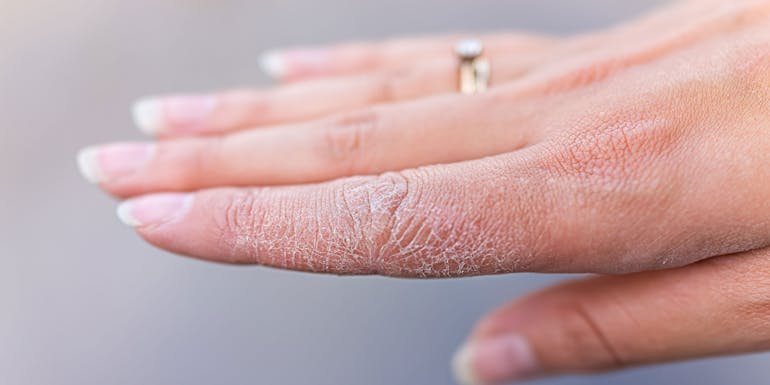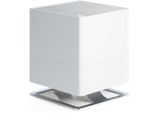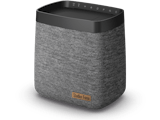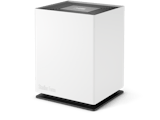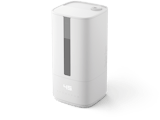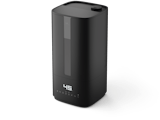
Nadine Walder, 23 December 2025
Humidify the air
Effects of excessively dry indoor air on the body
In the winter months in particular, the air indoors is often excessively dry. Dry indoor air can feel unpleasant and affect our health. The consequences of excessively dry indoor air range from dry skin, through burning eyes to respiratory problems. We explain the connection between dry air and the effects it can have on your body and show you what you can do to prevent it.
Read on to find out
- Dry air: coughs, respiratory problems and eyes
- Dry skin due to dry air
- Household remedies for dry skin, coughs and burning eyes
- Humidifiers for dry skin, coughs and burning eyes
Dry air: coughs, respiratory problems and eyes
Excessively dry indoor air can have a negative impact on your airways. Low relative humidity can limit the cleansing function of the mucous membranes and weaken the body’s defence mechanisms. This leads to an increased susceptibility to infections as the mucous membranes dry out and the layer of mucus becomes more permeable for pathogens which manifests itself in coughs, sore throats and colds, for example (1).
An interesting study on the connection between relative humidity and the absenteeism due to illness of schoolchildren produced astonishing results. Children who were not exposed to a humidification system at home or at school were found to have an absence rate of 7.1 %. By comparison, the absence rate for children who did have a humidification system at school and at home was found to be just 1.3 % (2).
As far as the eyes are concerned, low relative humidity has been shown to increase the frequency of blinking, cause eye irritations and burning eyes and can also lead to conjunctivitis (1). A dry environment can also lead to an increased rate of evaporation of the lacrimal fluid as a result of which the tear film which performs important functions in the eye becomes thinner. The possible consequences of this include burning eyes, inflammation and serious eye diseases.
Dry skin due to dry air
The skin is the largest human organ, and health problems can be very unpleasant. Humidity plays an important role for the skin. For example, dry air affects the skin's hydration level. Dry air draws moisture from the skin. This results in dry, itchy skin and can cause cracks. Excessively dry indoor air can also lead to unhealthy skin and limit its important protective function against temperature influences, light, injuries and infections.
Household remedies for dry skin, coughs and burning eyes
The best known, tried and tested household remedies for dry skin include oils such as coconut oil or argan oil, aloe vera, carrots, honey, avocado and drinking plenty of water. These household remedies provide moisture and have other properties that are good for the skin. Aloe vera, for instance, has an anti-inflammatory effect while honey is anti-bacterial and smoothing.
Honey also helps combat coughs and dry mucous membranes. The classic remedy for this is a glass of hot milk with honey and/or ginger. Other popular household remedies for coughs include drinking plenty of water, herbal teas, inhalations and steam baths, onion or potato compresses and onion juice with candied sugar.
There are also a number of proven household remedies for dry eyes. They include putting slices of cucumber, cooled teabags (camomile, black or green tea) or cotton wool soaked in cold milk on your eyes. Rubbing coconut oil around the eye area can also help with dry eyes. As with the other problems caused by dry indoor air, you should also make sure that you take on sufficient fluids.
The easiest way to avoid having to reach for these household remedies in the first place is to ensure that the indoor air does not become too dry.
Humidifiers for dry skin, coughs and burning eyes
Relative humidity of 40 % to 60 % is recommended for a healthy indoor climate. This is the range in which there are the fewest risks to health. A humidifier is ideal for creating a healthy indoor climate and combatting the effects of excessively dry indoor air or even stopping them from arising in the first place. A humidifier with a hygrostat can be set individually and you can specify your desired level of humidity. In addition, devices with hygrostats are extremely efficient as they switch off automatically as soon as the desired target level of humidity has been reached. So a humidifier will ensure that the indoor air never gets too dry – your skin, eyes and mucous membranes will thank you for it.
Would you like to find out more about how a humidifier can help you feel better or what different humidifier systems are available? You can find more information on our information page about humidifying the air.
More about humidifying the air
If you have questions related to indoor room climate, please get in touch with us. Or subscribe to our newsletter to regularly get informed about current topics regarding indoor climate, experience reports or Stadler Form insights.
Sources
(1) F. Nienaber, K. Rewitz, P. Seiwert, D. Müller, Einfluss der Luftfeuchte auf den Menschen und seine Gesundheit, White Paper RWTH-EBC 2021-001, Aachen, 2021, DOI: 10.18154/RWTH-2021-01238
(2) Arundel A. V., Sterling E. M., Biggin J. H., Sterling T. D. Indirect health effects of relative humidity in indoor environments. Environmental Health Perspect. 1986 Mar;65:351-61. doi: 10.1289/ehp.8665351.

